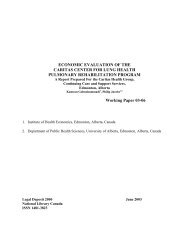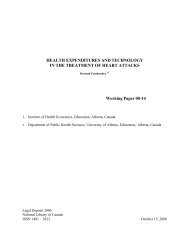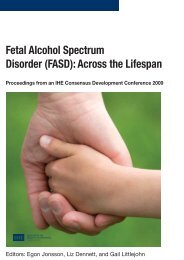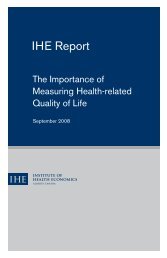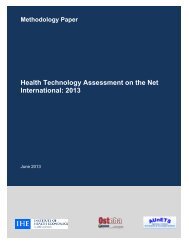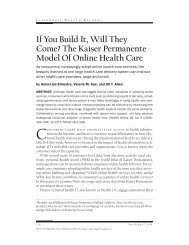Bariatric treatments for adult obesity - Institute of Health Economics
Bariatric treatments for adult obesity - Institute of Health Economics
Bariatric treatments for adult obesity - Institute of Health Economics
- No tags were found...
Create successful ePaper yourself
Turn your PDF publications into a flip-book with our unique Google optimized e-Paper software.
Another study also reported that, when compared to the weight-stable group, weight loss wasdetrimental <strong>for</strong> non-cancer mortality. However, the intentionality <strong>of</strong> weight loss was not reported.The third study conducted an analysis on overweight men and adjusted <strong>for</strong> several variables tocontrol <strong>for</strong> demographic variations and the probably <strong>of</strong> underlying diseases. This study showed thatmortality risk improved in the intentional weight loss group as compared to the weight-stablesubgroup; however there was no difference <strong>for</strong> those with comorbidities or who lost weightunintentionally.Overall, the impact <strong>of</strong> weight loss on mortality in men is not clear. A meta-analysis <strong>of</strong> all the studiesusing a random effect model demonstrated that, as compared to the reference group <strong>of</strong> overweightbut weight-stable men, the overall effective weight loss was shown to be slightly detrimental. Whenstudies with the outcome <strong>of</strong> intentional weight loss were combined using a fixed effect model, thehazard ratio became non-significant.Results <strong>for</strong> women and men combinedThree studies—one conducted in the United States, one in Canada, and one in Finland—examinedthe impact <strong>of</strong> weight loss on mortality risk in overweight or obese men and women. All three studiesreported mortality <strong>for</strong> a similar time period, from the mid 1980s to the beginning <strong>of</strong> the newmillennium. The participants in the US study were about a decade older than those in the otherstudies, hence the average age varied slightly between the studies.The US study adjusted their analysis <strong>for</strong> more than 13 variables and also attempted to account <strong>for</strong>known underlying diseases. For those who claimed to be trying to lose weight, the effects weremarginally beneficial if they remained weight-stable or lost small amounts <strong>of</strong> weight. In contrast, theFinnish study found that <strong>for</strong> those with intentional weight loss, the effect <strong>of</strong> weight loss wasdetrimental. A meta-analysis <strong>of</strong> these two studies indicated no significant difference between thegroups.The Canadian study examined the impact <strong>of</strong> bariatric surgery on mortality in morbidly obesepatients. Of the 1035 patients who received surgery, seven patients (0.7%) died as compared tothose under standard treatment, where 354 <strong>of</strong> 5746 patients (6.2%) died. Usually surgery is onlyconsidered <strong>for</strong> those to whom <strong>obesity</strong> is life-threatening. Consequently, the surgical group does havea substantially reduced mortality risk as compared to a comparable control group who did notundergo surgery. Similarly, the effects <strong>of</strong> the surgery are difficult to disentangle from any weight lossbenefits <strong>for</strong> this subgroup.Factors that may have an impact on the outcomesGender differences, the presence <strong>of</strong> comorbidities, and the notion <strong>of</strong> intentionality <strong>of</strong> weight losshave been identified as important factors that may have impacted outcomes. With respect to gender,<strong>for</strong> studies with men only and with men and women combined, the effects <strong>of</strong> weight loss onmortality were inconsistent regardless <strong>of</strong> intentionality. On the other hand, one study demonstratedbenefits from weight loss in overweight or obese women with pre-existing comorbidities. However,patients with diabetes, regardless <strong>of</strong> gender, benefited from intentional weight loss.Methodological limitationsBenefits <strong>of</strong> weight loss on all-cause mortality <strong>for</strong> overweight or obese patients are meager. The mostimportant explanations are intentionality, self-reporting <strong>of</strong> weight loss, and the time lapse betweenthe last recorded weight loss measurement and the mortality outcome.<strong>Bariatric</strong> <strong>treatments</strong> <strong>for</strong> <strong>adult</strong> <strong>obesity</strong> 89



